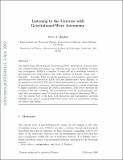Listening to the universe with gravitational-wave astronomy
Author(s)
Hughes, Scott A.
Download0210481v3.pdf (537.0Kb)
PUBLISHER_CC
Publisher with Creative Commons License
Creative Commons Attribution
Terms of use
Metadata
Show full item recordAbstract
The LIGO (Laser Interferometer Gravitational-Wave Observatory) detectors have just completed their first science run, following many years of planning, research, and development. LIGO is a member of what will be a worldwide network of gravitational-wave observatories, with other members in Europe, Japan, and—hopefully—Australia. Plans are rapidly maturing for a low frequency, space-based gravitational-wave observatory: LISA, the Laser Interferometer Space Antenna, to be launched around 2011. The goal of these instruments is to inaugurate the field of gravitational-wave astronomy: using gravitational waves as a means of listening to highly relativistic dynamical processes in astrophysics. This review discusses the promise of this field, outlining why gravitational waves are worth pursuing, and what they are uniquely suited to teach us about astrophysical phenomena. We review the current state of the field, both theoretical and experimental, and then highlight some aspects of gravitational-wave science that are particularly exciting (at least to this author).
Date issued
2003-01Department
Massachusetts Institute of Technology. Department of PhysicsJournal
Annals of Physics
Publisher
Elsevier
Citation
Hughes, Scott A. “Listening to the Universe with Gravitational-Wave Astronomy.” Annals of Physics 303, no. 1 (January 2003): 142–178.
Version: Author's final manuscript
ISSN
00034916
1096-035X